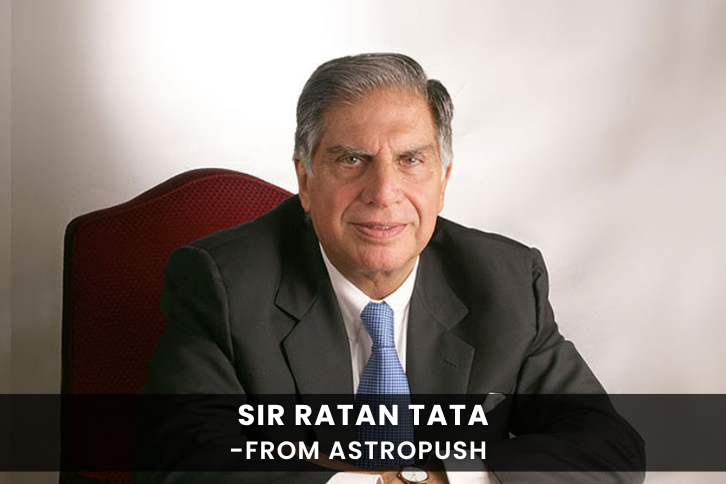The world has lost a legend—Ratan Tata, born on 28 December 1937, passed away on 9 October 2024. Ratan Tata was known for his leadership, philanthropy, and business acumen. His contributions left a lasting impact on India and the world. As the former chairman of Tata Sons, he transformed the Tata Group into a global powerhouse. Under his leadership, the company expanded its reach to over 100 countries. His passing leaves a void that will be deeply felt, but his legacy will continue to inspire generations to come.
Early Life and Entry into Tata Group
Ratan Tata was born into one of India’s most prominent business families, the Tata family, known for their significant contributions to Indian industry. Despite his affluent background, Ratan Tata was never one to rest on family laurels. His education at Cornell University and Harvard Business School gave him a global perspective, but it was his time at Tata Group that would shape the rest of his life.
Ratan Tata joined the Tata Group in 1962, starting in humble positions within Tata Steel’s shop floor in Jamshedpur. This hands-on experience laid the foundation for his future leadership style—he valued ground-level knowledge and believed in leading by example. Ratan Tata’s rise through the ranks was gradual and steady. In 1991, he became chairman of Tata Sons, succeeding his uncle J.R.D. Tata.
Visionary Leadership and Business Acumen
As chairman, Ratan Tata spearheaded a series of transformative initiatives that positioned the Tata Group as a global leader. One of his most notable achievements was the international expansion of Tata Group. Under his leadership, the company made bold acquisitions such as Tetley Tea in 2000, Corus Steel in 2007, and the prestigious Jaguar Land Rover in 2008. These moves not only elevated the Tata brand globally but also brought international acclaim to Indian businesses.
Ratan Tata’s vision was not limited to profits and acquisitions. He believed in sustainable growth and innovation. One of his most groundbreaking projects was the Tata Nano, launched in 2008. Billed as the world’s cheapest car, the Nano was designed to make automobile ownership accessible to the Indian middle class. Though the car didn’t achieve the commercial success expected, it demonstrated Tata’s commitment to innovation and inclusivity.
Also Read – Lord Rama Significance Today: More Important Than Ever Before
Philanthropy and Social Impact
Beyond the boardroom, Ratan Tata was a philanthropist at heart. He firmly believed in the responsibility of businesses to contribute to society. He dedicated much of his wealth to charitable causes, primarily through the Tata Trusts, which fund education, healthcare, rural development, and arts and culture in India.
His contributions to education were particularly noteworthy. Institutions like the Indian Institute of Technology (IIT), the Tata Institute of Social Sciences (TISS), and the Tata Memorial Hospital highlight Tata Group’s philanthropic impact. These institutions have played a key role in India’s development. Ratan Tata also made personal donations to universities like Harvard and Cornell. His contributions funded scholarships for Indian students, giving them access to world-class education and shaping future leaders.
The world will miss not just a business icon, but a man who believed in using wealth and influence for the greater good. Ratan Tata’s passing leaves behind a legacy of generosity and compassion that few can emulate.
Ethics and Values in Business
What set Ratan Tata apart from many other industrialists was his unwavering commitment to ethics. He championed transparency, fairness, and accountability within Tata Group, ensuring that it remained one of the most respected corporations worldwide. Even during challenging times, such as the 2008 global financial crisis, Tata maintained these values, focusing on long-term sustainability rather than short-term gains.
Tata’s ethical leadership became a model for others in the business community. His belief in treating employees with respect and offering them a safe, inclusive working environment helped the company maintain its reputation as one of India’s most employee-friendly organizations. This integrity extended to his dealings with competitors, government officials, and international partners, earning him global admiration.
Ratan Tata’s Global Impact: Redefining Indian Business on the World Stage
One of Ratan Tata’s most remarkable achievements was transforming the perception of Indian businesses on the global stage. Before his leadership, Indian companies were often viewed as domestically focused and limited in scale. However, Ratan Tata’s bold vision and strategic acquisitions redefined this narrative, positioning Indian companies as competitive players in the global market.
Ratan Tata demonstrated that Indian companies could thrive internationally through acquisitions like Jaguar Land Rover, Corus Steel, and Tetley Tea. These deals expanded Tata Group’s global footprint and highlighted India as a hub for innovation and quality. He skillfully integrated these global brands into Tata while preserving their identity, setting a benchmark for cross-border mergers.
Ratan Tata’s global impact went beyond business. His relationships with world leaders and business figures earned him deep respect worldwide. Whether in New York boardrooms or London government halls, he embodied Indian values of integrity, humility, and excellence. Tata not only built a global empire but also uplifted Indian entrepreneurship, a legacy that will continue to inspire.
Also Read – Krittika Nakshatra: The Fiery Star of Transformation
The World Without Ratan Tata
Ratan Tata’s passing has profoundly impacted the Indian business world and global industry leaders. He was respected for his humility and wisdom. Although Tata Group will continue to thrive under new leadership, his absence will be deeply felt. The loss of his moral compass, visionary thinking, and quiet determination leaves a significant void.
One of the most significant voids left by Ratan Tata is in the area of corporate philanthropy. His understanding of the role of businesses in shaping society made him an essential figure in India’s development narrative. Without his guiding hand, the landscape of Indian corporate responsibility may shift, but his legacy will remain a benchmark for future generations of business leaders.
What We Can Learn from Ratan Tata
Ratan Tata’s life offers lessons that go beyond business. His dedication to ethical leadership, his compassion for the underprivileged, and his ability to balance business success with social responsibility are qualities that anyone can strive to emulate.
In a world increasingly driven by profits and competition, Ratan Tata remained a beacon of integrity. His life teaches us that success is not just about wealth or power—it’s about how you use that success to make a difference in the world. His emphasis on giving back, through both personal and corporate philanthropy, sets an example for future generations of entrepreneurs and leaders.
Conclusion
Ratan Tata’s life and legacy go far beyond the industries he shaped or the wealth he generated. His contributions to society, his unwavering commitment to ethics, and his relentless pursuit of innovation have left a lasting imprint on the world. As we remember him, we must not only mourn the loss of a business leader but also celebrate the life of a man who genuinely cared about making the world a better place.
With services such as chat with astrologer online, talk to astrologer online, free kundli, free horoscope prediction, kundli matching, numerology, panchang calendar, and more. You can connect with expert astrologers anytime, anywhere. Whether you’re looking to explore your horoscope, find the ideal time to start a new project, or seek advice on a personal issue, AstroPush provides a variety of services to support your journey.
Ratan Tata may have left us, but his ideals, vision, and spirit will continue to inspire generations. The world will miss his gentle wisdom, but his legacy will live on through the institutions he built and the lives he touched. As we move forward, let’s strive to carry forward the lessons he taught us—about leadership, compassion, and the power of using success for the greater good.





